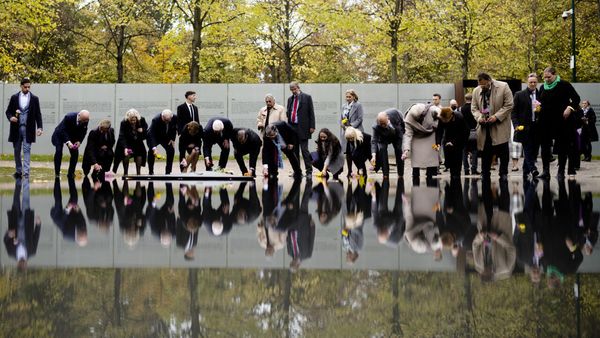(Bloomberg Businessweek) -- The protesters gathered outside the grand neo-classical presidential palace in Warsaw on a freezing Monday evening had a clear message for Andrzej Duda: don’t kowtow to Jews.
The following morning, Duda delivered what the government and far-right groups wanted. He signed legislation making it a criminal offense to suggest Poland was responsible for any role in the Holocaust, angering the U.S. and outraging Israel. The president declared his countrymen shouldn’t be “slandered” over Nazi atrocities on their soil.
While the argument is ostensibly about digging up the past, Poland finds itself increasingly isolated over its nationalist agenda. The government is in an escalating dispute with the European Union over the independence of its courts and opposition to taking in Muslim refugees. Ministers have needled Germany with a demand for World War II reparations.
If it was all designed to burnish the popularity of the Warsaw leadership at home, it worked. Support for the governing Law & Justice party hit records in recent months. But Poland now faces a hard truth: the nation is arguably more reliant on European money and American security than at any time since the collapse of communism. And both may soon be in shorter supply.
“Poland’s international position is the weakest since regaining independence in 1989,” a group of 18 former Polish ambassadors wrote in an open letter to the government this week. “Poland has lost the ability to influence even its closest foreign partners” as policies trigger “catastrophe after catastrophe,” said the ex-envoys, which included those to the U.S., Israel and Germany.
The mood in the EU is that Poland is at the heart of a widening rift between east and west, one that is potentially bigger than the U.K.’s “Brexit” decision to leave the bloc. The Berlin Wall has now been down longer than it was up, yet in Poland new barricades are being built.
A key NATO buffer state against Russia, Poland could at least rely on the U.S. under Donald Trump, who praised Law & Justice leader Jaroslaw Kaczynski on a visit to Warsaw last year for putting Poles first and doing his bit to maintain defense spending. Yet that relationship appears to be cooling, the State Department warning the Holocaust law might affect “Poland’s strategic interests.”
The U.S. is disappointed Duda signed the legislation, Secretary of State Rex Tillerson said in a statement late on Tuesday. Attempting to rewrite history and not respecting Europe’s fundamental values is condemnable, French Foreign Minister Jean-Yves Le Drian said on television on Wednesday.
Hard Cash
The immediate question is about money rather than clout. The nation of 38 million people is the biggest net recipient of EU aid -- 82.5 billion euros ($102 billion) for 2014 to 2020 alone -- and the biggest exporter of workers across the continent.
The guidelines for the next EU budget are due in May and will take into account the drop in income caused by Brexit. But momentum is also gathering to use cash as a way of ensuring rogue states can’t flout the democratic rule of law without consequences, according to diplomats in Brussels.
Some western member states, including Germany and France, were urging penalties. EU Justice Commissioner Vera Jourova said last month the bloc should underline the importance of rule of law and independent judiciary in all member states in the new budget. Ministers from national governments are set to discuss Poland at a meeting on Feb. 27.
“Poland’s case is becoming an element of the political bargaining about a very difficult budget,” said Piotr Buras, a political scientist from the European Council on Foreign Relations, a pro-EU think-tank. “We’re certainly at a critical moment.”
Polish Narrative
Law & Justice spent the last two years asserting its authority as the true savior of Polish values, replete with conspiracy theories, historical revisionism and the Catholic Church. Solidarity leader Lech Walesa was portrayed as a traitor, siding with the communists.
The party gained unwanted attention in November, when masked protesters marched in a central Warsaw rally commemorating the nation’s Independence Day with banners saying “Pure Blood” and “Europe will be white or uninhabited.” It condemned the racists, though no arrests were made.
Yet, there’s also an economy that’s doing well. Growth surged to its strongest in six years in the last quarter, powered by a mix of consumer demand from social handouts and an investment rebound. Over the last six months, the zloty gained 2 percent against the euro and remains the third-best performer among emerging-market currencies.
In many ways, it all plays into the government’s them-and-us narrative. Whether it’s taking over the judiciary or calling western European allies “sick,” Kaczynski, 68, says he does it in the name of standing up for ordinary Poles against the “elites.”
He said the Holocaust law covers accusations that Poland as a nation was complicit in the death camps in the country, such as Auschwitz, rather than prosecuting individuals for crimes against Jews. Kaczynski put the anger over it down to a misinterpretation of what it was about, a denial of the Polish point of view and a “drastic falsification of history.”
As for the row with the EU, his new western-educated prime minister, Mateusz Morawiecki, told the World Economic Forum in Davos last month it was also just a “misunderstanding,” between Warsaw and Brussels.
At a convention for Polish regional officials last week, the minister for investment and development tried to reassure them the money will keep flowing to them provided they spend it on time. Few, though, believed there wouldn’t be consequences.
Szymon Oglaza, an official from the Opole region that hosted the talks, summed it up: “Let’s not hide that our relationship with the EU does affect the budget.”
--With assistance from Gregory Viscusi
To contact the authors of this story: Wojciech Moskwa in Warsaw at wmoskwa@bloomberg.net, Marek Strzelecki in Warsaw at mstrzelecki1@bloomberg.net, Ewa Krukowska in Brussels at ekrukowska@bloomberg.net.
To contact the editor responsible for this story: Rodney Jefferson at r.jefferson@bloomberg.net.
©2018 Bloomberg L.P.







